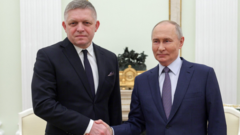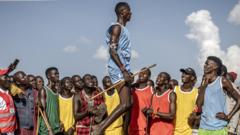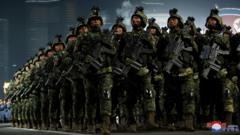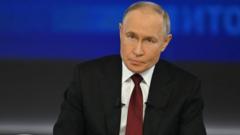North Korea's decision to send approximately 11,000 troops and military resources to Russia in support of its war against Ukraine has significant implications for both nations. While North Korea seeks economic relief and military advancement in the face of international sanctions, the long-term consequences of this alliance could be precarious.**
The Strategic Alliance: North Korea's Support for Russia in the Ukraine War**

The Strategic Alliance: North Korea's Support for Russia in the Ukraine War**
North Korea engages in a controversial military partnership with Russia, providing troops and weapons amidst mutual diplomatic advantages and hidden risks.**
North Korean leader Kim Jong-un has made a striking diplomatic maneuver by deploying approximately 11,000 troops along with various arms to assist Russia's ongoing conflict with Ukraine. This military collaboration, which sees North Korean forces mingling with Russian soldiers in the crucial Kursk region, has emerged as a strategic lifeline for Russia, aiding its efforts to regain territories previously overtaken by Ukraine. According to Pentagon spokesman Maj. Gen. Pat Ryder, North Korean military personnel have suffered casualties in this theater, highlighting the direct involvement of these troops.
For North Korea, this alliance is not merely a show of solidarity; it is also a critical source of economic and diplomatic support. Analysts posit that Mr. Kim is set to gain billions in return, receiving essentials such as food, oil, cash, and advanced armaments from Russia. Such resources are vital for sustaining his regime in the wake of crippling international sanctions, which have historically limited North Korea’s economic flexibility and growth potential.
Kim's regime has been beset by multiple crises in recent years. Strict sanctions spearheaded by the U.S. and supported by the U.N. have stymied North Korea's economy, prohibiting key exports like coal, seafood, and textiles. Efforts to break these sanctions through dialogue with former U.S. President Donald Trump fell flat in 2019, leading to further domestic discontent. The COVID-19 pandemic compounded these difficulties, isolating North Korea from international trade even more.
As Russia's military campaign in Ukraine stretches on, North Korea has recognized a chance to leverage its substantial military personnel and munitions stockpiles. The country boasts one of the largest standing armies in the world, numbering around 1.3 million troops, and has amassed vast caches of artillery, rockets, and increasingly sophisticated ballistic missiles as part of its ongoing military buildup under Kim's leadership.
The budding partnership began taking shape when North Korea hosted then-Russian Defense Minister Sergei Shoigu at a weapons parade in July. Not long after, North Korean arms began to flow into Russia, paving the way for reciprocal invitations and high-profile meetings between Kim and Putin, including tours of military facilities showcasing Russia's potential offerings to North Korea.
This growing alliance raises important questions about the motivations and implications for both nations. While North Korea garners immediate benefits in terms of military resources and diplomatic standing, the long-term ramifications of its involvement in the Ukraine conflict could pose significant risks, potentially internationalizing its already isolated stance and impacting geopolitical dynamics in unforeseen ways.
For North Korea, this alliance is not merely a show of solidarity; it is also a critical source of economic and diplomatic support. Analysts posit that Mr. Kim is set to gain billions in return, receiving essentials such as food, oil, cash, and advanced armaments from Russia. Such resources are vital for sustaining his regime in the wake of crippling international sanctions, which have historically limited North Korea’s economic flexibility and growth potential.
Kim's regime has been beset by multiple crises in recent years. Strict sanctions spearheaded by the U.S. and supported by the U.N. have stymied North Korea's economy, prohibiting key exports like coal, seafood, and textiles. Efforts to break these sanctions through dialogue with former U.S. President Donald Trump fell flat in 2019, leading to further domestic discontent. The COVID-19 pandemic compounded these difficulties, isolating North Korea from international trade even more.
As Russia's military campaign in Ukraine stretches on, North Korea has recognized a chance to leverage its substantial military personnel and munitions stockpiles. The country boasts one of the largest standing armies in the world, numbering around 1.3 million troops, and has amassed vast caches of artillery, rockets, and increasingly sophisticated ballistic missiles as part of its ongoing military buildup under Kim's leadership.
The budding partnership began taking shape when North Korea hosted then-Russian Defense Minister Sergei Shoigu at a weapons parade in July. Not long after, North Korean arms began to flow into Russia, paving the way for reciprocal invitations and high-profile meetings between Kim and Putin, including tours of military facilities showcasing Russia's potential offerings to North Korea.
This growing alliance raises important questions about the motivations and implications for both nations. While North Korea garners immediate benefits in terms of military resources and diplomatic standing, the long-term ramifications of its involvement in the Ukraine conflict could pose significant risks, potentially internationalizing its already isolated stance and impacting geopolitical dynamics in unforeseen ways.





















